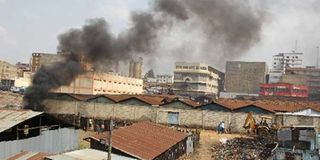Experts to help factories in war on pollution

Thick smoke billows from a road construction site behind an Eldoret market, polluting the air on February 10, 2014. Factories will now be provided with experts to work with in a new strategy to reduce pollution, the national environment watchdog has said. PHOTO | JARED NYATAYA | NATION
What you need to know:
- The National Environment Management Authority (Nema) will engage some specialists to advise companies on efficient use of their raw materials and other resources so that they can save up to Sh12 billion annually and produce less waste.
- The 35 companies in the area are saving up to Sh1 billion a year through the cost-effective production methods.
Factories will now be provided with experts to work with in a new strategy to reduce pollution, the national environment watchdog has said.
The National Environment Management Authority (Nema) will engage some specialists to advise companies on efficient use of their raw materials and other resources so that they can save up to Sh12 billion annually and produce less waste.
Nema director in charge of environmental education Ayub Macharia said the agency was moving away from the traditional system of “dropping regulations on the tables of factories and ordering them to comply.”
“We want to work step by step with companies to ensure they enforce environmental standards in an easier and more friendly manner,” he said.
LEARN FROM OTHERS
Under the new plan, Dr Macharia said, the authority had partnered with specialists from the Kenya Cleaner Production Centre, who would impart skills on better modes of industrial production.
“We are not just going to develop standards and ask companies to comply with them,” said the director. “We will take technical experts to them.”
Dr Macharia further said companies would be asked to learn from others that had voluntarily introduced cleaner production measures.
He cited a Sh90 million World Bank project that has encouraged firms in the Lake Victoria Basin to adopt cleaner production measures.
The 35 companies in the area are saving up to Sh1 billion a year through the cost-effective production methods.
Dr Macharia said Nema and the cleaner production centre were currently considering the companies that would participate in the project meant to save Nairobi River.
Under the city programme, more than 20 major factories had enrolled to adopt measures aimed at reducing emission of effluent into the crucial water source. The project is expected to save the industries up to Sh430 million per year.
The companies include Athi River Mining, Kenya Meat Commission, Mombasa Cement, East African Portland Cement Company, British American Tobacco and East African Breweries Limited
Others are Bamburi Cement, Kapa Oil Refineries, Leather Industries of Kenya and Savanna Cement.




